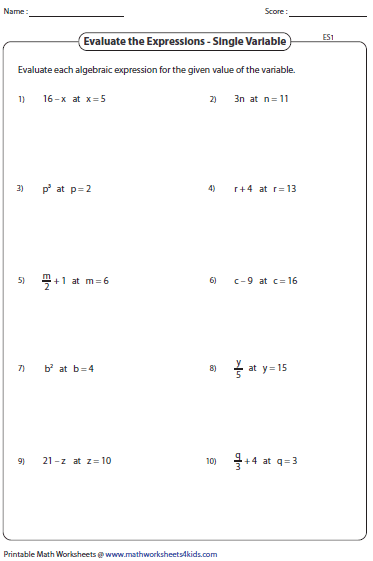Evaluate Algebraic Expressions Worksheet: Simplify Your Learning

Mastering algebra can often seem like a daunting task, but it's an essential skill for problem-solving and analytical thinking. One way to enhance your algebraic abilities is by working through an Evaluate Algebraic Expressions Worksheet. This tool helps students to practice and solidify their understanding of how to manipulate and solve expressions. Here's a comprehensive guide on how you can utilize such worksheets to improve your algebra skills:
Understanding Algebraic Expressions

Before diving into the worksheet, it’s crucial to understand what algebraic expressions are. An algebraic expression is a mathematical phrase that can contain ordinary numbers, variables (like x or y), and operators (such as addition, subtraction, multiplication, and division). Here are the basics:
- Variables: Symbols (often letters) representing unknown quantities.
- Constants: Known numbers that do not change within the expression.
- Operations: Add, subtract, multiply, divide, or use other operations to combine terms.
An example of an algebraic expression might be 3x + 4, where x is a variable and 3 and 4 are constants.

How to Evaluate Expressions

Evaluating an algebraic expression means to substitute the values for the variables and then solve for the result. Here's how you can do it:
- Identify the Variable: Look at the expression and identify which variables need to be substituted.
- Substitute Values: Replace each variable with its given value.
- Simplify: Perform the operations in the expression following the correct order of operations (PEMDAS).
Example of Evaluation

Consider the expression 2a + 3b - 4 where a = 2 and b = 5.
- Substitute the values into the expression: 2(2) + 3(5) - 4.
- Perform the multiplication first: 4 + 15 - 4.
- Then, add and subtract from left to right: 15.
🔎 Note: Always follow the order of operations when simplifying expressions to ensure accuracy.
Worksheet Practice

Utilizing an Evaluate Algebraic Expressions Worksheet effectively involves structured practice. Here’s what your worksheet might look like:
| Expression | Substitute | Evaluate |
|---|---|---|
| 7x - 3 | x = 2 | 7(2) - 3 = 11 |
| 4a + b - 2 | a = 3, b = 1 | 4(3) + 1 - 2 = 9 |
| 2(x + 3) | x = 5 | 2(5 + 3) = 2(8) = 16 |

By filling out these worksheets, you'll gradually become more adept at manipulating expressions quickly and accurately.
Tips for Using Algebraic Expression Worksheets

- Start Simple: Begin with expressions that have just one or two variables to build confidence.
- Understand each step: Do not just solve the problem; understand why each operation is performed.
- Practice Regularly: Consistency is key in mastering algebra.
- Review Errors: If you make a mistake, go back and see where you’ve gone wrong. Learn from your errors.
- Seek Help: If an expression is particularly challenging, don’t hesitate to ask for clarification or seek additional resources.
🔑 Note: Practicing algebraic expressions can also help with understanding mathematical logic and structure, which are useful in various fields beyond algebra.
Wrap-up

Engaging with an Evaluate Algebraic Expressions Worksheet is more than just practice; it’s about building a foundation in algebra that will support advanced mathematics, science, economics, and many other areas of study. By consistently working through these exercises, you’ll not only enhance your ability to evaluate algebraic expressions but also develop critical thinking skills that apply to real-world problem-solving. The key is to approach each worksheet with curiosity and patience, understanding that mastery comes through persistence and learning from every step of the process.
Why is it important to practice algebraic expressions?

+
Practicing algebraic expressions helps in developing logical thinking, problem-solving skills, and prepares you for more advanced mathematical concepts and real-world applications.
How often should I use algebraic expression worksheets?

+
Regular practice is crucial; aim for at least 2-3 times a week to maintain and improve your algebraic skills.
What if I find an expression too difficult to evaluate?

+
Take a break, review basic principles, and possibly seek additional resources or tutoring to understand the specific concept or operation you’re struggling with.